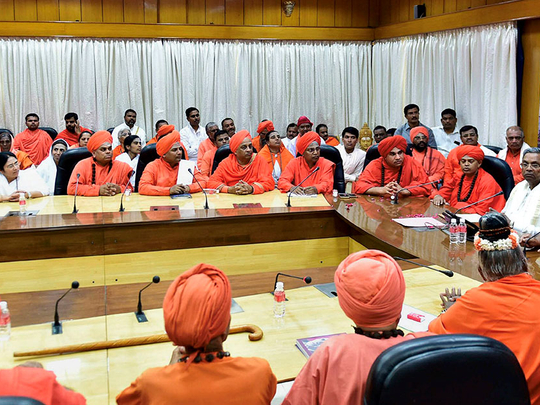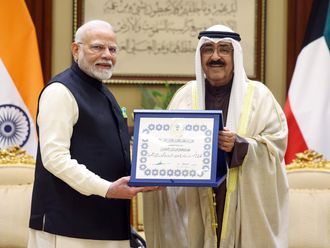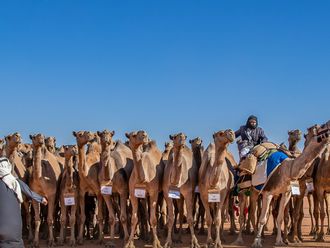
When the Lingayat group’s long-time bid to be granted independent religion status made it past the Karnataka State Cabinet last week, it came with a huge whiplash. The Veerashaiva community, considered by some a sub-sect of the group, were up in arms over the tumble of benefits that were now in the grasp of the Lingayats, while political opponents of the Congress are seeing it as a strategy to divide and conquer supporters ahead of the 2019 elections. Eventually the Veerashaiva were put under the umbrella of Lingayat wing, causing much consternation, for even within the group are fractions of disagreement. So is the Lingayat issue one of reclaiming identity or is it one about vote politics?
The journey to this point has been long and rumbling. However, the bid only started to gather momentum in 2017, when a number of rallies that saw 100,000 people show up in Bidar to make the ‘minority tag’ demand.
“The term Lingayat cannot be attributed to any community or caste. This is an independent religion. Lingayat has become a part of Hindu religion due to the ignorance of people. Lingayat should be an independent religion,” seer Mather Mahadevi, from the Basava Dharma Peetha, said at the time.
Basavaraj Dhannur, one of the rally’s organisers, said, “We have demanded constitutional recognition as a religion. We have all the requirements to be recognised as a religion. The state government must recommend this to the Centre. This… has been delayed due to lack of political will. It [the rally] was a show of our strength. This is a 900-year-old philosophy, and researchers have provided proof to substan-tiate that Lingayat is a religion.”
Finally, the Karnataka State Minorities Commission formed a seven-member committee, headed by retired high court Judge H.N. Nagamohan Das, which submitted its report on March 2, 2018, and was subsequently given a favorable response.
Who are the Lingayats?
This group is based mainly in Karnataka – where it claims 17 per cent of the population - although there are huddles of the community across the country. The group has an influence over nearly 100 seats in the 224-member assembly, which could turn the tide during elections.
Followers of 12th-century social reformer Basavanna, the Lingayats consider themselves out of the Hindu fold because of their belief in the formless version of the deity they pray to – Shiva – while Hindu belief bends towards idol worship.
Then there is the issue of being considered a caste: the Lingayats are considered part of the four-tier hierarchical system, in spite of eschewing some basic tenets – such as the vedas (texts) - of the religion. The lines blur because there are some elements of Brahmanical Hinduism that have been adopted and adapted by them.
On the politicisation of the Lingayat agitation, historian Manu Devadevan is quoted by Indian Express newspaper as saying: “The movement took off in the early twentieth century. In the late nineteenth century when the first census took place, most of the communities in India started identifying themselves as homogenous groups. So to a large extent, it was a cultural movement then. You don’t find anything explicitly political there. That happens only after the 1980s.”
What does Hinduism say?
Hinduism is like a patchwork quilt of practices, philosophy and history. Some of the rituals reportedly date back to 2nd millennium BC, or earlier. But while it’s got a rich amalgamation of text and traditions, there are areas where the seams seem to pull apart or are too tightly sewed together. “Hinduism has no single founder, no single scripture, and no commonly agreed set of teachings,” explains BBC.
What is agreed upon is the holy trinity – Brahma: the creator; Vishnu: the preserver; and Shiva: the destroyer – and a number – 33million, to be exact – of other deities.
Considering however that there is no one organised body to audit the religion, it seems unlikely that the core system would distance itself from a tweaked belief in representation.
What does this mean, politically?
India, which calls itself ‘secular’, is being jolted under PM Narendra Modi’s reign by tugs of Hindutva - an ideology that propagates the Hindu belief and way of life.
While the constitution of India, drafted in 1949, calls for equality and freedom of religion and speech for all, power games have whittled away fundamental rights to the whims of a state.
Leadership now appears to be a race for the best political policy tout.
First came the renaming of states – to make them sound ‘more Indian’; then the holy cow war that saw people lynched and beaten; then came the split of states; and finally, of religion.
Because it’s a democracy that feeds on the idea of by the people, for the people, and citizens like to ‘see one of our own’ on the seat of power, politicians have acquired an almost perverse desire to claim vote banks – using them as bargaining chips into a party or state.
Chief minister of Karnataka Siddaramaiah’s move to tag the group a minority may come with a number of benefits for the group which would make minority status – including a foothold into the quota system – but it reeks, say detractors, of political cunning, after all the move has come just months ahead of the assembly elections.
Union minister Ananth Kumar, for instance, slammed the move on March 20, claiming the United Progressive Alliance (UPA) government had rejected a similar proposal in 2013, saying it would cause the Scheduled Caste members of the group to lose reservation benefits.
"Several demands were made in the past and even the Maharashtra government had also sought a separate religion tag for Veerashiva-Lingayat sect. But the then UPA government in 2013 rejected it," the parliamentary affairs minister was quoted as saying by IANS.
Meanwhile, BJP President Amit Shah was quoted as saying by Indian media on Wednesday: "Consider-ing caste equations before giving ticket to a candidate is one thing but stoking casteist passions is quite another. The Congress is doing the latter in Karnataka to reap political benefits just ahead of the assembly polls.”
Is opposition, however, futile? The Lingayats are seen as largely supportive of BJP and their state leader BS Yeddyurappa – who at one point was for the move. But the new strategy has caused some turmoil in the ranks; besides mud slinging, the party has been vigilant about staying neutral on the issue of support.
Indians speak
“It is indeed sad that the educated class of society wants to contest elections on basis of religion. Irony that both are blaming each other for making religion as voting tool. The bigger question is, is India really a secular state? This type of politics generates hatred leading to crime and bloodshed in the streets. In the end only the poor are murdered.”
- Dinesh Kothari
“It is for maintaining loyalty among the voters who brought the parties in power. And let's not even talk about the whole "bringing back the glory days of Hindutva" bit.”
- Supriya Ramalingam
“Sounds like when they named Bangalore to Bengaluru. Doesn't benefit anyone really, apart from the sentiments of a few and inconveniencing several others.”
- Shahbaaz Ali Khan
“It's just a bunch of people trying to take advantage of the benefits of being the minority.”
- Priyamvada Sharma











